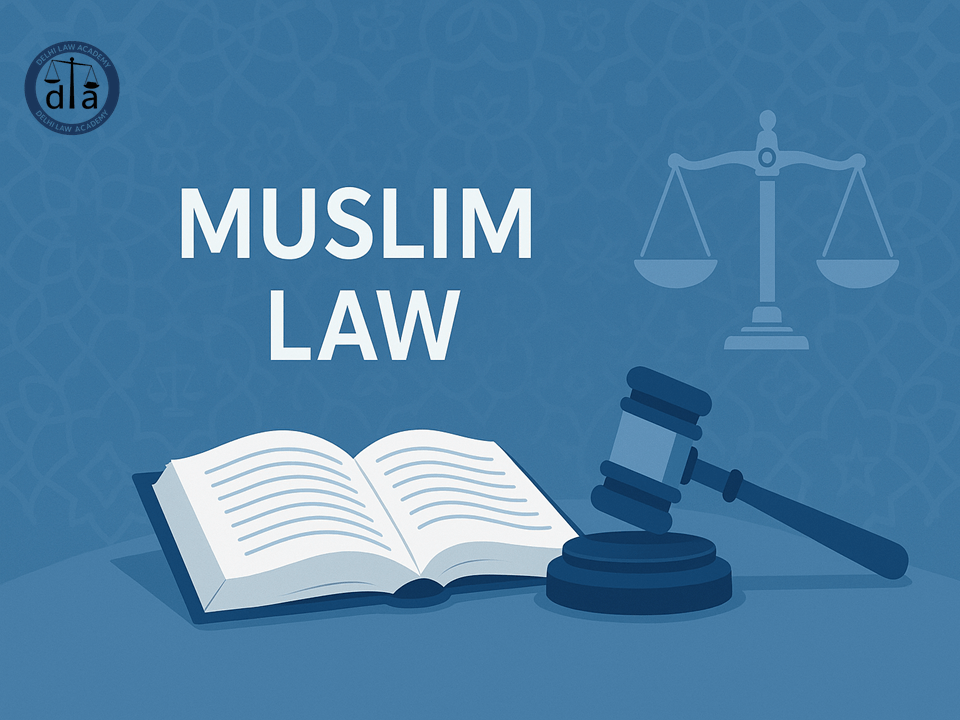
RASHID AHMAD v. MT. ANISA KHATUN [1932 PC]
🔹 A talak actually pronounced under compulsion or in jest is valid and effective.
🔹 Upon divorce by the triple talak, Ghiyas Uddin could not lawfully remarry Anis Fatima until she had married another and the latter had divorced her or died.
Muslim Law is an important component of most Judicial Service exams
Its thorough knowledge is a must for all aspirants of RJS, DJS, PCS (J) and other Judicial Service exams. To help such aspirants, DELHI LAW ACADEMY JAIPUR has launched a series of study material modules on all important aspects of this important part of their syllabus.
Case Details: Rashid Ahmad v. Mt. Anisa Khatun [1932 PC]
LORD THANKERTON – This is an appeal from a decree of the High Court at Allahabad, dated 1st February 1927, which reversed a decree of the Court of the Subordinate Judge of Bijnor. The dispute relates to the succession to the estate of Ghiyas Uddin, a Mahomedan, who died in April 1920, leaving considerable moveable and immoveable property.
The appellants are plaintiffs in the suit, which was instituted in 1922, and are a brother and sister of Ghiyas Uddin, and, along with respondents 10 to 12, who were impleaded as pro forma defendants, would be heirs to Ghiyas Uddin according to Mahomedan law, if respondents 1 to 6 (who were defendants 1 to 6), are unable to establish their claim to be the widow and legitimate children of Ghiyas Uddin.
The main controversy turns on four stages in the matrimonial history of Anis Fatima, respondent 1, viz.:
- Her marriage to Manzur Husain in 1901;
- Her divorce by Manzur Husain early in 1905;
- Her marriage to Ghiyas Uddin on 28th August 1905;
- Her divorce by Ghiyas Uddin on or about 13th September 1905.
It is admitted that Anis Fatima was married to Manzur Husain in 1901, but the respondents maintain that the marriage was invalid on the ground that both parties were minor at the time.
The fourth stage was the alleged divorce by Ghiyas Uddin in September 1905. The appellants’ case was that on 13th September 1905, Ghiyas Uddin pronounced the triple talak of divorce in the presence of witnesses, though in the absence of the wife, and that the latter received Rs. 1,000 in payment of her dower on the same day, for which a registered receipt is produced. There was also produced a talaknama, or deed of divorce, dated 17th September 1905, which narrates the divorce, and which is alleged to have been given to Anis Fatima.
There is nothing in the case to suggest that the parties are not Sunni Mahomedans governed by the ordinary Hanafi law, and, in the opinion of their Lordships, the law of divorce applicable in such a case is as follows:
- The divorce called “talak” may be either irrevocable (bain) or revocable (raja).
- A talak bain, while it always operates as an immediate and complete dissolution of the marriage bond, differs as to one of its ulterior effects according to the form in which it is pronounced:
- Once, followed by abstinence from sexual intercourse, for the period called the iddat;
- Three times during successive intervals of purity (between successive menstruations), no intercourse taking place during any of the three intervals;
- Three times at shorter intervals, or even in immediate succession;
- Once, by words showing a clear intention that the divorce shall immediately become irrevocable.
The first named of the above methods is called ahsan (best), the second hasan (good), the third and fourth are said to be bidaat (sinful), but are, nevertheless, regarded by Sunni lawyers as legally valid.
In the present case the words of divorce addressed to the wife, though she was not present, were repeated three times by Ghiyas Uddin as follows:
“I divorce Anisa Khatun for ever and render her haram for me”
which clearly showed an intention to dissolve the marriage. There can be no doubt that the method adopted was the fourth above described, and this is confirmed by the deed of divorce, which states that the three divorces were given “in the abominable form,” i.e. bidaat. The learned Judges of the High Court have erred in treating the divorce as in the ahsan form, instead of the bidaat form.
The talak was addressed to the wife by name. In the bidaat form the divorce at once becomes irrevocable, irrespective of the iddat. It is not necessary that the wife should be present when the talak is pronounced, and though her right to alimony may continue until she is informed of the divorce.
Their Lordships are of opinion that the pronouncement of the triple talak by Ghiyas Uddin constituted an immediately effective divorce, and they are of opinion that the validity and effectiveness of the divorce would not be affected by Ghiyas Uddin’s mental intention that it should not be a genuine divorce. A talak actually pronounced under compulsion or in jest is valid and effective.
The respondents sought to found on the admitted fact that for about 15 years after divorce Ghiyas Uddin treated Anis Fatima as his wife and his children as legitimate; but once divorce is held proved such facts could not undo its effect or confer such a status on respondents.
While admitting that upon divorce by the triple talak, Ghiyas Uddin could not lawfully remarry Anis Fatima until she had married another and the latter had divorced her or died, the respondents maintained that the acknowledgement of their legitimacy by Ghiyas Uddin, subsequent to the divorce raised the presumption that Anisa Fatima had in the interval married another who had died or divorced her, and that Ghiyas Uddin had married her again, and that it was for the appellants to displace that presumption.
The legal bar to remarriage created by the divorce in the present case would equally prevent the raising of the presumption. If the respondents had proved the removal of that bar by proving the marriage of Anisa Fatima to another after the divorce and the death of the latter or his divorce of her prior to the birth of the children and their acknowledgment as legitimate, the respondents might then have had the benefit of the presumption but not otherwise. Their Lordships are therefore of opinion that the appeal should be allowed, that the decree of the High Court should be reversed.
📚 Continue Your Muslim Law Preparation
Don’t stop here! Strengthen your knowledge of Muslim Law with our blogs:
📘 Free Study Material for Judiciary Aspirants!
Download our FREE study material prepared by Delhi Law Academy’s expert faculty.
📌 Frequently Asked Questions: Rashid Ahmad v. Mt. Anisa Khatun [1932 PC]
🔹 The triple talak pronounced by Ghiyas Uddin in the bidaat form was immediately effective and irrevocable. It dissolved the marriage instantly, irrespective of the iddat period or the wife’s presence.
🔹 Yes. Even if a talak is pronounced under compulsion or in jest, it is considered valid and effective under Sunni Muslim law.
🔹 No. The wife’s presence is not necessary for the validity of a talaq in the bidaat form, though her right to alimony may continue until she is informed of the divorce.
🔹 No. He could not lawfully remarry her until she had married another man and that man had divorced her or died, maintaining the legal bar to remarriage.
🔹 Ahsan: Divorce once followed by abstinence during iddat (best).
🔹 Hasan: Divorce three times during successive menstruations (good).
🔹 Bidaat: Three times at shorter intervals, immediate succession, or clearly irrevocable once; regarded as sinful but legally valid.
🔹 No. Once the divorce is proved, subsequent acknowledgment or treatment of children as legitimate by the father does not change their legal status unless specific legal conditions (like remarriage of the wife) are met.
Contact us
📍 Delhi Law Academy – Jaipur Branch
6C, Tower 2, Coaching Hub, Pratap Nagar, Jaipur – 302033
📞 Phone:
+91 9911916552
+91 8447285606
✉️ Email:
contactus@delhilawacademy.com

